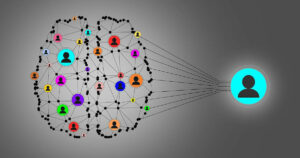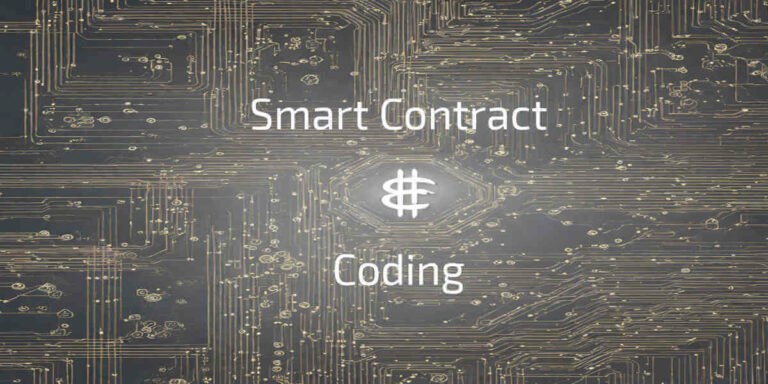
Imagine a computer program for making deals. Just like a vending machine: you put in a coin, choose a snack, and the machine gives it to you. Digital contracts work a bit like that, but online. As more people learn about a special kind of technology called blockchain, knowing about smart contract coding and how they can replace intermediaries in many industries, such as purchasing a piece of land, becomes really useful.
In this article, we’re going to chat about smart contract coding and why this matters. Then we talk about the steps to start making your own smart contracts, as well as the different computer languages you can use, including the top programming languages. Finally, we will give you helpful tips to make sure you do a good job.
So, buckle up! We’re going on a fun tech journey to help you understand and make your very own with this first smart contract coding tutorial!
- 1. Understanding Smart Contracts
- 2. What is Smart Contract Coding, and how does it Work?
- 3. Why is Smart Contract Coding Important?
- 4. How do I Start Programming Smart Contracts?
- 5. Top Smart Contract Programming Languages
- 6. Best Practices in Smart Contract Development
- 7. Basic Requirements for Smart Contract Development
- 8. Challenges in Smart Contract Coding
- 9. Is understanding Blockchain necessary for Programming Smart Contracts?
- 10. Conclusion
- 11. FAQ
Understanding Smart Contracts
Smart contracts are like digital promises. They’re computer programs that automatically do certain things when certain conditions are met. Think of them like vending machines – you put in a coin and get a snack. No person needed to make it happen! These contracts work on something called a blockchain, which is like a digital ledger or diary.
If you need a deeper understanding, then consider reading “What is a smart contract“. By learning how to code these contracts, you can do cool things in the world of digital money and more. Some people use computer languages like JavaScript and Python to write them. Dive into it and discover a whole new digital adventure! In the world of smart contracts, they cannot be deleted by default. Once a deployed contract is out, any interactions with them are irreversible.
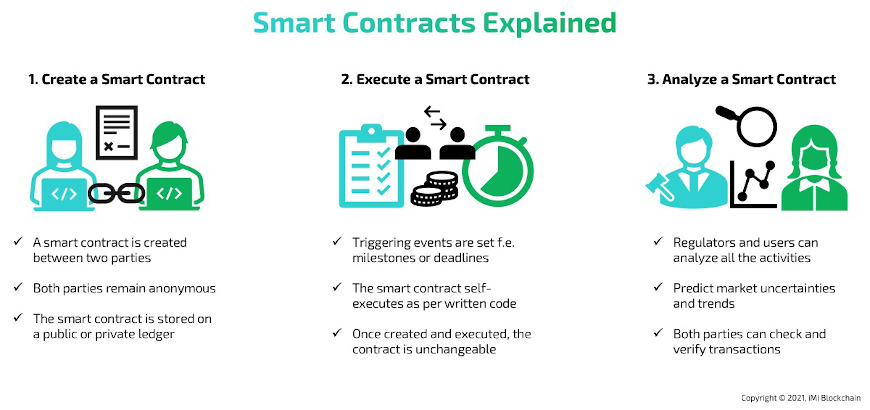
Share this Image on Your Site:
Importance of Smart Contracts in Blockchain Technology
They’re a big part of something called smart contract crypto, which is like a digital ledger where all actions are saved. Instead of needing someone in the middle, like a bank, to help with a deal, these digital deals do it by themselves, providing speed, scalability, and predictable fees. This makes things quicker and cheaper, especially in the world of cryptocurrencies.
With a Solidity smart contract, you can also make special apps on the Ethereum blockchain that don’t need any third party to facilitate the transaction. Imagine being able to trade with others without needing anyone to check if it’s all okay. People can use common computer languages, like JavaScript and Python, to make these, including the Bitcoin Scripting Language for exchanging digital currency during a bitcoin sale. In short, smart contracts let people do new and exciting things in the digital world!
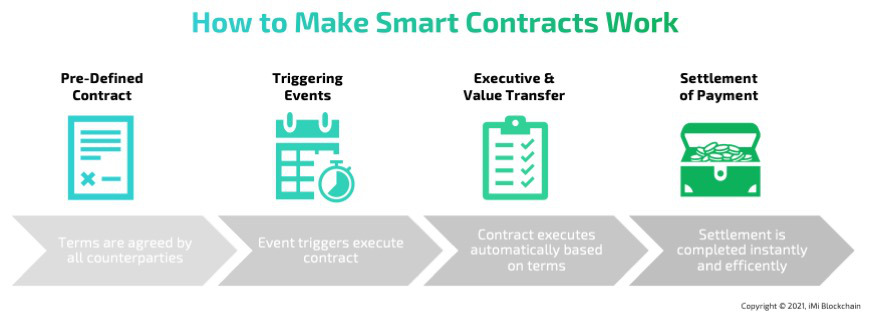
Share this Image on Your Site:
What is Smart Contract Coding, and how does it Work?
Smart contract coding is the process of writing computer programs that automatically execute predefined actions when certain conditions are met. These programs are stored on a blockchain network and run exactly as programmed without any possibility of downtime, censorship, fraud, or third-party interference.
Imagine you and a friend have a deal: if you mow their lawn, they’ll pay you $20. Usually, you’d trust each other to keep your ends of the deal. But what if there was a robot referee that could automatically make sure both of you do what you promised? That’s kind of what it is!
A smart contract is like a set of instructions that are saved on the computer, specifically on a special kind of computer system called a “blockchain“. Once you and your friend agree on the rules (like mowing the lawn for $20), you put it into the deal. After that, the smart contract automatically checks if the lawn was mowed, and if it was, it makes sure your friend pays you the $20.
How Does It Work?
- Setting the Rules: Just like our lawn mowing deal, you decide on a rule or agreement.
- Coding the Contract: A programmer writes this rule into computer language, programming smart contracts.
- Putting it on the Blockchain: This contract is then saved on the blockchain, which is like a special digital ledger (or a big, secure notebook).
- Automatic Checks: It constantly checks if the rules are followed.
- Automatic Actions: Once the rules are met (like the lawn getting mowed), the contract automatically does its job (like giving you the $20).
So, smart contract coding is a way to create digital agreements that make sure everyone does what they promised without needing someone to watch over them. Cool, right?
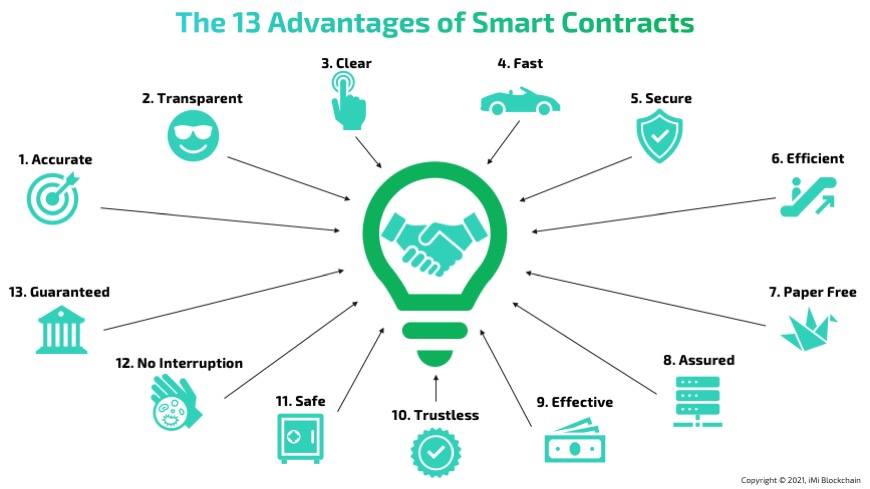
Share this Image on Your Site:
Why is Smart Contract Coding Important?
Smart contracts are like computer programs that help people make deals without needing a middleman. They make things safer and faster. Because more people are using a system called blockchain, knowing how programming smart contracts works is becoming really important for complex transactions. When these contracts work well, they save money, make things run smoothly, and people trust the deals more. When you learn how to make these contracts, you help blockchain become even better and more useful in many areas by simplifying complex transactions into defined lines of code and utilizing the use of these contracts.
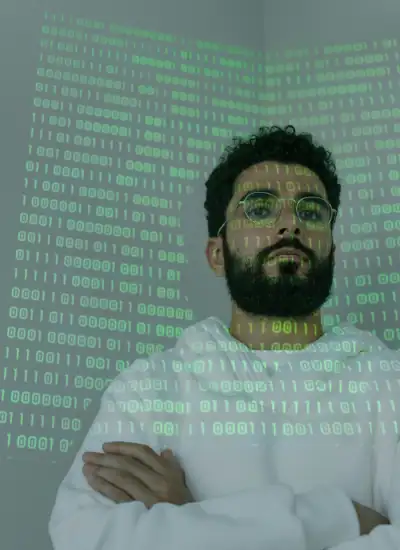
Unlock the Code: Master Blockchain Programming!
Dive into the world of decentralized technology with our comprehensive online programming courses. Learn at your own pace and get:
Access – to expert instructors.
Interactive – coding exercises.
Vibrant – community of like-minded learners.
Certified – receive your recognized diploma.
ENROLL TODAY AND TRANSFORM YOUR FUTURE!How do I Start Programming Smart Contracts?
Smart contracts are like digital deals that work automatically. Imagine having a machine that gives out candy when you put in a coin. That’s how they work but with computer codes. There are computer languages to help you make these contracts. Two popular ones are Solidity and Vyper code. Before you start, you’ll need to get some tools and set up a spot on your computer.
Think of it like building with blocks. Start with the basic ones first. Maybe try making something like a digital coin. If you get stuck or want to learn more, there are many online guides and lessons, such as this tutorial, to help you learn and build your first digital contract using Solidity on the Ethereum blockchain for Dapps. Dive in and see what cool things you can create with programming smart contracts and simplify the development process with the help of Moralis!
Top Smart Contract Programming Languages
Smart contracts are like computer programs that help us make deals or trades. Think of them as digital agreements. To write these agreements, we use special computer languages. The most popular programming languages are Solidity, Vyper, Yul, Clarity, Rust, and Java. Solidity is the most popular smart contract programming language used for building contracts on various blockchain platforms. It was introduced by Ethereum founder Gavin Wood in 2014 and runs on platforms such as Ethereum, Binance, Tron, Polygon, Solana, and more. Each language has its own special features and its group of supporters. The best language to use depends on what you want to do. Learning these languages, including Solidity which runs on the Ethereum virtual machine (EVM), will help you make your own.
Choosing the Best Smart Contract Language
Smart contracts are like computer programs that help people agree on things without needing someone in the middle. When you want to pick one of the most popular languages to write these contracts, it’s like choosing the right tool for a job. The right choice will make your journey fun and exciting!
Solidity for Ethereum

This is like the English of smart contract languages. Many people use it, especially for a platform called Ethereum. If you want to talk to a lot of robots on Ethereum, you’d use Solidity. All you need is a wallet full of Ether (ETH).
Rust

Rust is a good programming language for smart contracts! If you’re diving into this world, Rust can be a trustworthy and reliable tool in your toolkit!
Vyper

Think of this as a simpler version of Solidity. It’s like if Solidity is Shakespearean English, Vyper is everyday, casual English. It’s designed to be easier and safer, but not everyone uses it.
Chaincode
This is like speaking Klingon (from Star Trek) – it’s used for a special group of robots called Hyperledger Fabric. It’s good if you’re working specifically with those robots.
Python
Python is like a Swiss army knife in the world of programming; it can do a lot of things! But just like how you might not use a Swiss army knife to chop down a tree, Python isn’t the first choice for contract coding.
Smart contracts are special programs that run on blockchain networks, like Ethereum. Most of these networks use other programming languages specifically designed for them. However, Python can be helpful in other ways. It can help create and manage them or interact with the blockchain. It’s just not the main tool to write the actual contract.
JavaScript
JavaScript can be used for smart contract coding on some blockchain platforms, like Lisk.
Yul
Even though YUL can be powerful, it’s like using a chisel and hammer instead of pre-made blocks. So, you’d use YUL in programming smart contracts when you want to do something very specific, or you want to optimize parts of it to save on costs. However, for most regular tasks, there are easier tools and languages available.
Java
Java is like a Swiss Army knife for computer programs – it can do many things. But for something specific like smart contract coding, other tools might be better. Java is great for many things like building websites, mobile apps, and even games.
Which to Choose? Just like you’d speak Spanish in Spain and French in France, you’d choose the language based on where you are and what you need. If you’re working on Ethereum, Solidity might be your go-to. If you want something simpler on Ethereum, maybe try Vyper. And if you’re with the Hyperledger group, then Chaincode is for you!
Remember, the most important thing is making sure you and your robot friend understand each other!
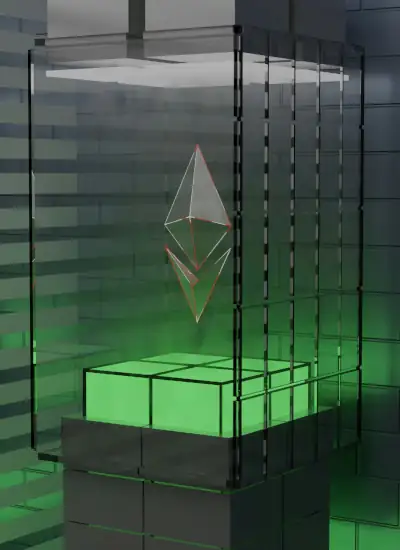
Unlock Your Business Potential with Certified Blockchain Consulting!
Dive into the future of technology with our team of certified blockchain experts. Simply pick the service you need:
Personalized Advice – tailored to your business needs.
Comprehensive Training – for you and your team.
Development Services – innovative solutions from the whitepaper to the finished blockchain.
Programming – with capabilities and tools to succeed.
TALK TO THE EXPERTS TODAYBest Practices in Smart Contract Development
Smart contract developers ensure that the digital agreements run on the internet. Think of them as computer programs that do things automatically when certain conditions are met. They’re becoming really popular because of something called blockchain. In this article, we’ll talk about what these contracts are, why they’re important, and how to make one. We’ll also chat about the different computer languages you can use to create them. Making these contracts might sound tricky, but we’ll give you tips and steps to help out. And don’t worry if you don’t know what blockchain is – you can still learn how to make these contracts!
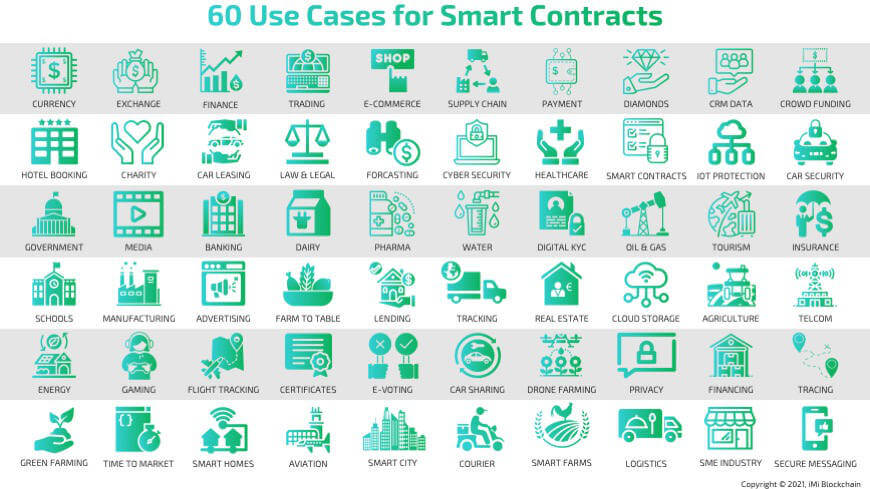
Share this Image on Your Site:
Basic Requirements for Smart Contract Development
Smart contracts are like special rules on the internet that help people make deals safely. Think of them like a digital handshake. To make these digital handshakes, you need to know some computer languages. One popular language is called Solidity.
But there’s more! It’s good to understand how blockchains work. Blockchains are like digital ledgers or lists. They help keep track of everything in a secure way. Knowing how websites work is also helpful since digital contracts can be used on websites.
Lastly, you need a place to practice and test these contracts. This place is called a blockchain network. Some are like playgrounds where you can test things out.
So, with the right tools and knowledge, you can start making your own digital handshakes!
Challenges in Smart Contract Coding
Smart contracts are like special computer programs that help people make deals without needing a middleman. Think of it like an automatic vending machine. But, just like any machine, they need to be made safely so that bad people can’t misuse them. Here are some challenges and things to think about when making them:
- Safety First! Just like we need to be safe online, they need to be safe too. Since many people are interested in this new technology, some might try to find security issues and ways to cheat or break it. Developers, or the people who make these contracts, have to be very careful to protect them.
- Knowing the Rules: Every type of online contract system has its own set of rules. Developers should know these rules well. It’s like knowing the rules of a board game before you play. This helps them make contracts that work well.
- Clear Instructions: When developers make these contracts, they should write clear instructions (or what we call documentation). This is so that other people can understand and use them easily. Think of it like the rules in a game manual.
- Clean Code: It’s important to write the contract in a way that’s easy to read and understand. This helps prevent mistakes and makes it simpler to fix or update in the future.
- Best Practices: This means developers should follow the best ways to do things, like checking their work and getting feedback from others. This helps make sure the contracts are top-notch.
- Handling a Crowd: As more people use these contracts, they need to work quickly and without problems. Developers should think about how to make contracts that can handle many people using them at once.
In short, making such contracts is a cool job, but it comes with challenges. It’s all about keeping things safe, clear, and efficient.
How to overcome common challenges in Smart Contract coding?
Smart contracts are like computer programs that help people make deals on the internet. Imagine making a promise with a friend, and the computer makes sure both of you keep that promise. That’s what these contracts do. As more people use them, we need to learn how to make them right. In this article, we’ll talk about what they are, why they’re cool, and how you can start making them. We’ll also see which computer languages are best for making them. And don’t worry if you don’t know about blockchains; we’ll help with that too! Let’s learn together!
For the second part:
To make smart contract programming right, use good rules and tools. Test them out, work with friends who know about them, and always learn about the newest ways to do it.
Why is Clarity Important?
When you use a smart contract, you want to be 100% sure it works right. It’s like when you play a game; you want to know the rules are clear and fair. If the contract is confusing or has mistakes, it could make the wrong decision or cause other problems. So, clarity means making sure it is simple, easy to understand and does what it’s supposed to do.
Reading Blockchain App Documentation
Building a smart contract for a blockchain network is a bit like building that LEGO castle. The “app documentation” for the blockchain is like the instruction manual for your LEGO set. Reading the app documentation before starting to code one is like reading the instruction manual before building a LEGO castle. It helps you understand what you’re working with, avoid mistakes, and make sure your creation works well and looks great!
Is understanding Blockchain necessary for Programming Smart Contracts?
Smart contracts are like computer programs that work with blockchain. Think of blockchain as a big digital notebook. When you understand how this notebook works, it’s easier to make them using templates. Knowing about things like transactions (exchanges of digital info) and blocks (sets of these exchanges) helps. Also, when you understand blockchain, you can use cool features to make your contracts better. This knowledge can also give you more chances to do fun things in the world of blockchain.
Conclusion
Smart contracts are like computer programs for the blockchain world. They help make sure deals or promises are kept without needing a middleman. Think of them as special digital handshakes! By learning to write these contracts, you can be part of the cool new changes in how we do things online.
It might sound hard, but starting with these contracts isn’t too tricky. Just like learning a new game, there are rules and steps to follow. If you run into problems, don’t worry! With some tips and the right tools, you can get past them.
Want to learn more? Join our coding class! Our teachers will show you how it’s done, step by step. Dive into this exciting tech world with us. Save your spot now!
Learn Coding Now!
Coding Training in Small Classes
Webinars about Codes
Courses at University Level
Free Blockchain Tips!
Get monthly tips on Blockchain.
On top, you’ll get our free Blockchain beginners course. Learn how this technology will change our lives.
FAQ
Is coding smart contracts hard?
Coding smart contracts is tough, especially for beginners. They use languages like Solidity. Learning about blockchain is also tricky. But with hard work, tutorials from iMi Blockchain, and patience, you can get good at it.
How do I make money from coding smart contracts?
To make money from smart contract coding, learn how to write them, and then offer your skills to businesses or projects that use blockchain. Some people also create their own apps or systems on the blockchain and earn from users or transactions. Always keep learning and improving!
What are some common mistakes to avoid when coding smart contracts?
When coding smart contracts, there are several common mistakes that should be avoided, including insufficient testing; lack of input; inadequate access control; poor error handling; ignoring gas costs; and using outdated libraries or frameworks. By being aware of these common mistakes and taking steps to avoid them, you can ensure the integrity and security of your code.

